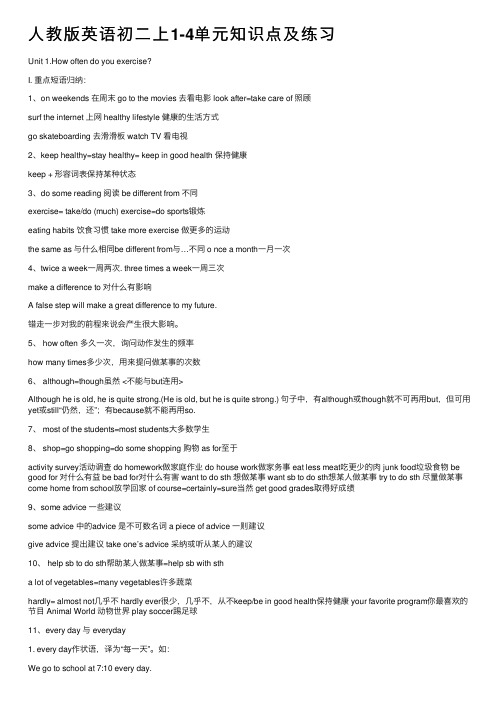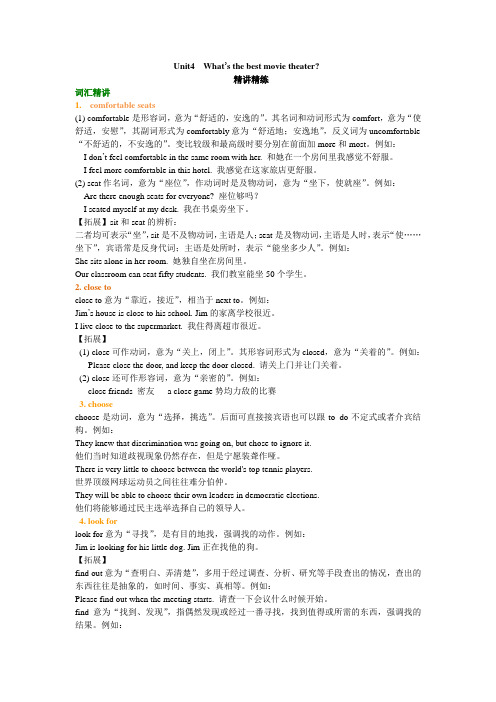人教版初二英语上知识点与练习
人教版英语初二上1-4单元知识点及练习

⼈教版英语初⼆上1-4单元知识点及练习Unit 1.How often do you exercise?I. 重点短语归纳:1、on weekends 在周末 go to the movies 去看电影 look after=take care of 照顾surf the internet 上⽹ healthy lifestyle 健康的⽣活⽅式go skateboarding 去滑滑板 watch TV 看电视2、keep healthy=stay healthy= keep in good health 保持健康keep + 形容词表保持某种状态3、do some reading 阅读 be different from 不同exercise= take/do (much) exercise=do sports锻炼eating habits 饮⾷习惯 take more exercise 做更多的运动the same as 与什么相同be different from与…不同 o nce a month⼀⽉⼀次4、twice a week⼀周两次. three times a week⼀周三次make a difference to 对什么有影响A false step will make a great difference to my future.错⾛⼀步对我的前程来说会产⽣很⼤影响。
5、 how often 多久⼀次,询问动作发⽣的频率how many times多少次,⽤来提问做某事的次数6、 although=though虽然 <不能与but连⽤>Although he is old, he is quite strong.(He is old, but he is quite strong.) 句⼦中,有although或though就不可再⽤but,但可⽤yet或still“仍然,还”;有because就不能再⽤so.7、 most of the students=most students⼤多数学⽣8、 shop=go shopping=do some shopping 购物 as for⾄于activity survey活动调查 do homework做家庭作业 do house work做家务事 eat less meat吃更少的⾁ junk food垃圾⾷物 be good for 对什么有益 be bad for对什么有害 want to do sth 想做某事 want sb to do sth想某⼈做某事 try to do sth 尽量做某事come home from school放学回家 of course=certainly=sure当然 get good grades取得好成绩9、some advice ⼀些建议some advice 中的advice 是不可数名词 a piece of advice ⼀则建议give advice 提出建议 take one’s advice 采纳或听从某⼈的建议10、 help sb to do sth帮助某⼈做某事=help sb with stha lot of vegetables=many vegetables许多蔬菜hardly= almost not⼏乎不 hardly ever很少,⼏乎不,从不keep/be in good health保持健康 your favorite program你最喜欢的节⽬ Animal World 动物世界 play soccer踢⾜球11、every day 与 everyday1. every day作状语,译为“每⼀天”。
人教版八年级上册英语Units1-10单元知识点完整归纳以及练习题

人教版八年级上册英语Units1-10单元知识点完整归纳以及练习题人教版八年级上册英语Units1-10单元知识点完整归纳以及练习题Unit1 go on vacation去度假stay at home待在家里go to the mountains去爬山go to the beach去海滩visit museums 参观博物馆go to summer camp去参观夏令营quite a few相当多study for为……而学习go out 出去most of the time大部分时间taste good尝起来很好吃have a good time=have fun玩得高兴+v.ing X Kb1 .C of course当然feel like给……的感觉;感受到go shopping去购in the past在过去walk around四处走走because of因为one bowl of…一碗……the next day第二天drink tea喝茶find out找出;查明go on继续take photos照相something important重要的事up and down上上下下come up出来buy sth. for sb. / buy sb. sth.为某人买某物taste + adj. 尝起来……look+adj. 看起来……nothing…but+动词原形除了……之外什么都没有seem+(to be)+ adj. 看起来……arrive in+大地点/ arrive at+小地点到达某地decide to do sth.决定去做某事try doing sth.尝试做某事/ try to do sth.尽力去做某事forget doing sth.忘记做过某事/ forget to do sth.忘记做某事enjoy doing sth.喜欢做某事want to do sth.想去做某事start doing sth.开始做某事stop doing sth. 停止做某事dislike doing sth. 不喜欢做某事keep doing sth.继续做某事keep sth+adj.使…保持…状态Why not +v.?=Why d on’t you+v.?为什么不做……呢?so+adj.+that+从句如此……以至于……tell sb. (not) to do sth. 告诉某人(不要)做某事feel like +n./v.ing sth 想要…想要做…一、根据句意,用所给单词的适当形式填空。
初中英语人教版八上Unit1知识点及练习题

初中英语⼈教版⼋上Unit1知识点及练习题教学主题:(⼈教版)8AU1Section B:Where did you go on vacation?教学重难点:1.课⽂讲解;2.基础题练习教学过程:1.导⼊Monday, July 1sthI arrived in Penang in Malaysia this morning with my family. It was sunny and hot, so we decided to go to the beach near our hotel. My sister and I tried paragliding,. I felt like I was a bird. It was so exciting! For lunch, we had something very special-Malaysian yellow noodles. They were delicious! In the afternoon, we rode bicycles to Georgetown. There are a lot of new buildings now, but many of the old buildings are still there. In Weld Quay, a really old place in Georgetown, we saw the houses of the Chinese traders from 100 years ago. I wonder what life was like here in the past. I really enjoyed walking around the townTuesday, July l6thWhat a difference a day makes! My father and I decided to go to Penang Hill today. We wanted to walk up to the top, but then it started raining a little so we decided to take the train. We waited over an hour for the train because there were too many people. When we got to the top, it was raining really hard. We didn’t have an umbrella so we were wet and cold. It was terrible! And because of the bad weather, we couldn’t see anything below. My father didn’t bring enough money, so we only had one bowl of rice and some fish. The food tasted great because I was so hungry!2.呈现1.activity n.活动。
人教版初中英语初二上册Unit 4知识讲解与练习

Unit4 What’s the best movie theater?精讲精练词汇精讲fortable seats(1) comfortable是形容词,意为“舒适的,安逸的”。
其名词和动词形式为comfort,意为“使舒适,安慰”,其副词形式为comfortably意为“舒适地;安逸地”,反义词为uncomfortable “不舒适的,不安逸的”。
变比较级和最高级时要分别在前面加more和most。
例如:I don’t feel comfortable in the same room with her. 和她在一个房间里我感觉不舒服。
I feel more comfortable in this hotel. 我感觉在这家旅店更舒服。
(2) seat作名词,意为“座位”,作动词时是及物动词,意为“坐下,使就座”。
例如:Are there enough seats for everyone? 座位够吗?I seated myself at my desk. 我在书桌旁坐下。
【拓展】sit和seat的辨析:二者均可表示“坐”,sit是不及物动词,主语是人;seat是及物动词,主语是人时,表示“使……坐下”,宾语常是反身代词;主语是处所时,表示“能坐多少人”。
例如:She sits alone in her room. 她独自坐在房间里。
Our classroom can seat fifty students. 我们教室能坐50个学生。
2. close toclose to意为“靠近,接近”,相当于next to。
例如:Jim’s house is close to his school. Jim的家离学校很近。
I live close to the supermarket. 我住得离超市很近。
【拓展】(1) close可作动词,意为“关上,闭上”。
其形容词形式为closed,意为“关着的”。
(完整版)人教版八年级上册英语unit1知识点及习题

Unit1 Where did you go on vacation一、书本重要语法点梳理go on vacation去度假 stay at home待在家里go to the mountains去爬山 go to the beach去海滩visit museums 参观博物馆 go to summer camp去参观夏令营quite a few相当多 study for为……而学习go out出去most of the time大部分时间taste good尝起来很好吃 have a good time玩得高兴]of course当然feel like给……的感觉;感受到go shopping去购物in the past在过去walk around四处走走because of因为one bowl of…一碗…… the next day第二天drink tea喝茶find out找出;查明go on继续 take photos照相something important重要的事 up and down上上下下come up出来buy sth. for sb. / buy sb. sth.为某人买某物taste + adj. 尝起来…… look+adj. 看起来……nothing…but+动词原形除了……之外什么都没有seem+(to be)+ adj. 看起来……arrive in+大地点 / arrive at+小地点到达某地decide to do sth.决定去做某事try doing sth.尝试做某事 try to do sth.尽力去做某事forget doing sth.忘记做过某事 forget to do sth.忘记做某事enjoy doing sth.喜欢做某事 want to do sth.想去做某事start doing sth.开始做某事 stop doing sth. 停止做某事dislike doing sth. 不喜欢做某事keep doing sth.继续做某事Why not do. sth.为什么不做……呢so+adj.+that+从句如此……以至于……tell sb. (not) to do sth. 告诉某人(不要)做某事1. on vacation 度假vacation意为“假期、假日”,相当于holiday,但vacation 表示长的假期。
人教版英语初二上5-8单元知识点及练习题

Unit 5 Can you come to my party?知识点提纲:another/other/others/the other/the others;thank you for;who/whom; Study for...;Keep用法;have to/must/其他情态动词的用法比较;【重要词组】baseball game棒球比赛the day after tomorrow 后天come over to 从一地方来到另一个地方,过来go to the doctor 去看病 have a piano lesson上钢琴课have to 不得不 next time 下一次study for a test 准备考试 be free 有空儿,有时间【部分词汇用法】1、do my lessons做功课have a lesson / have lessons (学生)上课:give a lesson to sb. / give lessons to sb. (老师)给某人上课:give sb. a lesson给某人一个教训:The illness taught him a lesson, so he wanted to exercise every day.2、another作形容词:I am still hungry. I want to have another apple.作代词: I don’t like this shirt. I want to have a look at (看)another. from one to another 从一个到另一个:I’m going hiking from one city to another.3、other/ others/another/the other/the othersother 作形容词或代词,做形容词时,意思是“别的,其他”,泛指“其他的(人或物)”。
人教版八年级英语上册unit 10基础知识点期末复习及训练(含答案)

Unit10基础知识点期末复习及训练(含答案)Unit 10 If you go to the party, you will have a great time 基础知识点复习一、重点短语复习1.stay at home待在家里2.take the bus乘公共汽车3.tomorrow night明天晚上4.have a class party进行班级聚会5.half the class一半的同学6.make some food做些食物7.order food订购食物 8.have a class meeting开班会9.at the party在聚会上 10.potato chips炸土豆片,炸薯条11.in the end最后 12.make mistakes犯错误13.go to the party去参加聚会 14.have a great/good 玩得开心15.give sb. some 16.advice给某人提一些建议17.go to college上大学 18.make(a lot of)money赚(许多)钱19.travel around the world环游世20. careless adj. 粗心的;反义词:careful,意为“小心的”。
21. advise doing sth. 建议做某事;advise sb.(not)to do sth. 建议某人(不)做某事22. run away from“从…逃离” “逃避”23. cut …in half “切成两半”24.tell sb. to do sth. 告诉某人做某事25.too…to d o sth. 太……而不能做某事26.be afraid to do sth. 害怕做某事 27.need to do sth. 需要做某事二、重点句型1. It’s best (not) to do sth.最好(不)做某事2.give sb. some advice给某人提一些建议3.tell sb. to do sth. 告诉某人做某事4. have a great time 意为“玩得愉快”,=enjoy oneself, = have fun, =have a good / wonderful / nice time5.have a great / good time in (doing) sth. 做某事很开心6.be afraid +that从句例:I’m afraid that I can’t finish on time7. It’s best (not) to do sth.最好(不)做某事例:It’s best to speak English every day.三、易错知识点辨析1. be afraid to do sth. 害怕干某事例句1、I’m afraid to speak in front of other people.be afraid of sth. 害怕某事例句2、He told me not to be afraid of difficulties.be afraid +that从句例句3、I’m afraid that I can’t finish on time2. advise v.“劝告;建议”n. advice,是不可数名词.例句1、Give me some advice!advise doing sth. 建议做某事。
人教版英语八年级上册Unit 1知识点详解及练习

5.wait/weɪt/v.等待
用法
例句
wait for sb./sth.
意为“等待某人/某物”
We were waiting for her at the train station at 8 o’clock last night.
Tom was waiting for the bus over there.
1. I saw many old people ________ in line buying cheap eggs.
A. walkingB. waitingC. decidingD. talking
2. Can you ________ me five minutes, please?
A. wait forB. waitC. waitingD. waited
3.enjoyable/ɪn'dʒɒɪəb(ə)l/adj.有趣的,令人愉快的
用法
例句
(1) enjoyable
意为“有趣的”
I’m sure we’ll have an enjoyable vacation.
(2) enjoy sth.
动词,意为“喜爱某事”
My mum enjoyed her job in the city.
在句子中修饰事物
The story was so boring.
(3)拓展
以-ed结尾的形容词通常修饰人,例如interested感兴趣的。
Iam interested in movies.
(4)拓展
以-ing结尾的形容词通常修饰事物,例如interesting有趣的。
Thisis an interesting book. I love it so much.
- 1、下载文档前请自行甄别文档内容的完整性,平台不提供额外的编辑、内容补充、找答案等附加服务。
- 2、"仅部分预览"的文档,不可在线预览部分如存在完整性等问题,可反馈申请退款(可完整预览的文档不适用该条件!)。
- 3、如文档侵犯您的权益,请联系客服反馈,我们会尽快为您处理(人工客服工作时间:9:00-18:30)。
1.exercise 名词或动词eg: Everyone should exercise once a day.If we don't get more exercise ,we will get fat.exercise作名词时,既可作可数名词,也可作不可数名词,当作“锻炼、运动”时,为不可数名词,当表示一系列有规律的运动时作可数名词,作“练习题”讲时,也可用作可数名词。
eg: We do morning exercise every day.2.hardly 几乎不,几乎没有eg:The twins hardly watch TV on weekdays.Hardly形式上是由hard后加ly 构成,但并非hard的副词形式,hard 本身既可作形容词也可作副词,意为“努力地”eg:My sister works hard.3.ever 曾,曾经ever作副词,常和现在完成时连用,用在疑问句、否定句、条件状语从句中,位于句中(助动词、be动词后,实意动词前)eg:Have you ever been to beijing?(1)ever用于肯定句中,意为“常常、总是”eg:He is ever ready to help his friends.(2)Ever 用于含有比较级或最高级的句子中,意为“在以往任何时候”用来加强语气。
eg:It is raining harder than ever.(3)ever 用于特殊疑问句中,意为“究竟、到底”。
Eg:which ever do you want?4.On weekends在周末,通常用于一般现在时中,一般指saturday、sunday,eg:I don't work on weekends.5.I often go to the movies.我经常去看电影go to the movies=go to the films/cinema6.how often 意为“多久一次”用来提问事情发生的频率,常用every(1)sometimes意为有时,做频度副词,表示动作发生的不经常性,多用于现在或过去时态,在句中的位置比较灵活eg:Sometimes I am late for school.(2)Sometime是副词,表示在过去或将来的某个时候,指的是时间点,用语过去或将来时,对它的提问用when.eg:—When will you come back? —Sometime later next month.(3)Some times是名词短语,意为几次几倍,对它提问用how many times。
eg:He has been to Shanghai some times.(4)Some time是名词短语,表示“一些时间、一段时间”,指时间段。
eg:I will be away for some time.8.active 活跃的,积极的active构成的短语:be active in 在某方面表现积极,eg:Lei Feng was always active in helping others.;take an active part in 积极参加,eg:Students should take an active part in exercise.9.about 几乎;大约,等于around Eg:It's about lunch time.about 的其他用法:(1)作副词,意为“到处、各处、四周”eg:I'm used to going abou alone.(2)作副词,意为“在附近”eg:Miss Yang must be somewhere about.(3)作介词,意为“在周围,在…附近”eg:Let's walk about the scool(4)作介词,意为“关于,与…有关”eg:What do you know about him?10.as for 至于,关于相当于一个介词,多用于开始一个与前面相关的新话题,后面跟名词或代词,也可跟相当于名词的短语。
eg:As for being a scientist,I haven't thought about it..11.health n. 健康. Good health helps you get good grades. Junk food is bad for your health. healthy adj. 健康的;You have to keep healthy. How do you keep healthy? 反义词: unhealthy adj. 不健康的My cat has an unhealthy lifestyle, because it sleeps in the days and plays with the rats(老鼠) at nights.12.Have a good health. keep healthy; keep in good health.13.how many 多少(可数)How many books do you have? How many friends does your sister have? how much 多少(不可数)How much junk food did you eat last night? How much water do you drink everyday?14.try v.尽力;试图;尝试I tried many times to help him, but he didn’t listen to me at all. (try to do sth. 尽力做某事) I am trying learning English.(try doing sth. 尝试做某事)I am trying not to play with him. ( try not to do sth. 尽量不去做某事) 15.better good (adj) 和well (adv)的比较级,一般情况下,比较级在词尾加-er 但是,good 的比较特殊变化。
希望同学们可以加以区别;He is good, but she is better ( than him) . You can do better next time.16.less 更少的(little 的比较级,修饰不可数)less 跟better 一样,都是特殊的比较级变形,请同学样一定要对比记忆。
You must eat less junk food , or you will become unhealthy. (become 传说中的连系动词,同学们还能记得其他的连系动词吗?)二、典型例题1.She was a quite girl,but she is very_____now.A.beautifulzyC.friendlyD.active2."______do you go to the library?" "I usually go to the library twice a week."A.How longB.How oftenC.How farD.How many3.The result_______the 500-metre race will be known right now.A.OnB. OfC.atD.with4.Most students like ________ _________ _______.(网上冲浪)5.What's your father's ________ ______?(电视节目)6.Zhang Hua piays football _____ _____ _____ _____.(一周三次)7.What do you usually do ____ ______(在周末)on weekends8.John exercise every morning.(对画线部分提问)____ _____ John ____ every morning?9.I sleep nine hours every night.(对画线部分提问)____ ____ hours do you sleep every night?10. Tom usually _____(come) to school at seven in the morning.(用所给词的适当形式填空)三、课后练习1. —How often does Kate go hiking?—.A. I guess she’s OK.B. About an hour.C. Once the week.D. Twice a week.2. There are 50 students in our class. 75% students like going hiking. What does “75%” mean?A. None of the students.B. All the students.C. Most of the students.D. Some of the students.3. They usually do some office work weekdays.A. inB. onC. atD. both B and C4. I have time to have lunch.A. sometimesB. hardC. hardlyD. already5. —do you go shopping?—Every Sunday.A. How soonB. How many timesC. How muchD. How often6. —do you have a class meeting?—Once a week.A. How muchB. How oftenC. What timeD. How long7. I see her in the supermarket.A. sometimeB. some timeC. sometimesD. some times8. —did you watch TV?—About two hours.A. How farB. How oftenC. How soonD. How long9. The results “watching TV” are interesting.A. atB. inC. forD. on10. He is a good student. He late for school.A. isn’t neverB. is oftenC. is alwaysD. is hardly everB.句型转换1. Most students exercise three times a week.(就划线部分提问)do most students exercise?2. I sleep nine hours every night.(就划线部分提问)hours do you sleep every night?3. My favorite program is Animal World.(就划线部分提问)your favorite program?4. My sister often goes to a movie on weekends.(就划线部分提问)your sister often on weekends?5. She sometimes does her homework at school.(就划线部分提问)does she her homework at school?中考链接()1. —______ is “Lucky 52” shown on CCTV-2?—Every week.A. How oftenB. How longC. How soonD. How many times()2. —How was the weather yesterday?—It was terrible. It rained ______. People could go out.A. hardly; hardlyB. hard; hardC. hard; hardlyD. hardly; hard()3. —do you exercise?—Four times a week.A. How muchB. How oftenC. How longD. How many二、用单词的适当形式填空。
